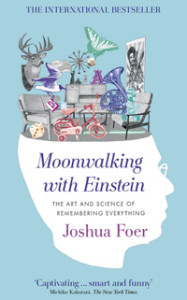Moonwalking with Einstein
The art and science of remembering everything
by Joshua Foer. Published by Penguin www.penguin.co.uk
You must remember this, a kiss is just… ah, what was it again?
Memory is a tricky thing. Ever had to call your own mobile because you can’t remember where you left it? Or walked up and down the street trying to spot where you parked your car? Wouldn’t it be great if we all had memories as good as those memory-champion folk who can recall the order of a shuffled deck of cards after only 30 seconds of study.
The author, Joshua Foer thought so too after covering the 2005 US Memory Championship and watching competitors outdo each other in recalling a 50 line poem, matching 100 photos and names, memorising 300 random words and 1000 random numbers. All very impressive – especially so since the competitors all claimed to have only average memories. Foer takes them up on their contention that anybody can learn their tricks and this book is a recount of his journey from doubting journalist to competitor in the 2006 US Memory Championships.
‘Moonwalking with Einstein’ isn’t a self-help or how-to book – though Foer does cover enough of the MA’s (mental athletes) techniques that you can try them for yourself – rather it’s a trip through the art and history of memory. Along the way he talks to memory specialists from neurologists to commercial memory trainers trying to find out what memory actually is and why it’s so seemingly mercurial. We also visit the memory Palace where Simonides of Ceos is said to have invented the art of memory in 5th Century BC Greece, the OK Plateau (where our brains stop learning when they decide we’re ‘good enough’ at something) and discover how ancient scholars actually used scrolls. We also meet some eccentric MAs and a variety of memory savants from ‘S’ who had to write things down in an effort to prevent himself from remembering too much, the real ‘Rain Man’ and ‘EP’, a retired gentleman who – thanks to a brain infection – can’t form new memories and who’s grandchildren are a daily revelation.
Foer’s style is light and anecdotal without being too superficial. There are plenty of interesting nuggets of information on the current understanding of what memory actually is and how it works interleaved throughout the personal narrative. By the end the reader is really rooting for Foer (and, indeed for the other blindfold and ear muff wearing competitors) sweating it out over the last deck of cards. Does Foer win? Does he really end up with a perfect memory? Does he become a ‘super journalist’ who never has to take notes? I won’t spoil it for you but here’s a quote:
“A few nights after the championship I went out to dinner with a couple of friends, took the subway home and only remembered as I was walking in the door to my parent’s house that I’d driven a car to dinner. Not only had I forgotten where I’d parked it, I’d forgotten that I had it.”
Now, where are those Post-Its?
